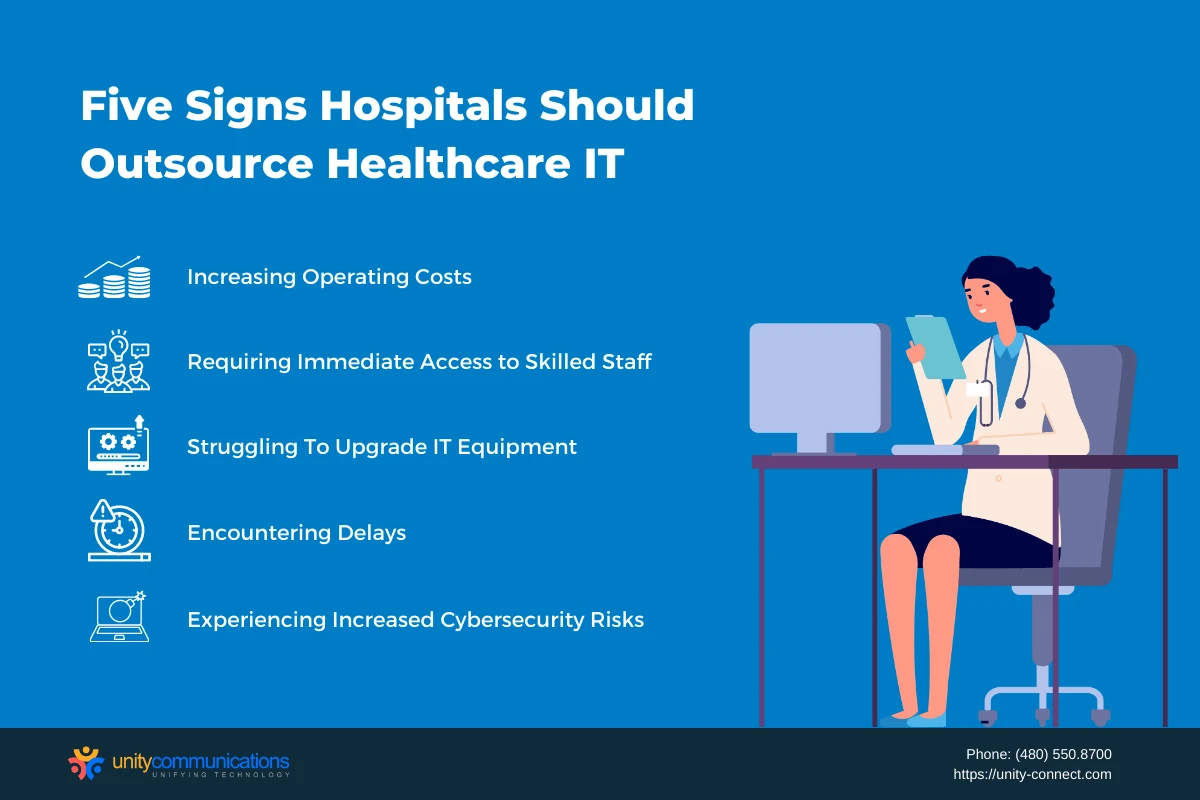Written by Joyce Ann Danieles
Contents
Digital transformation boosts the healthcare industry’s ability to treat illness, develop new medications, and facilitate a healthy lifestyle. Advanced technologies also help medical staff streamline administrative tasks.
Unfortunately, high operating expenses, limited access to a skilled workforce, and increased cyber threats prevent healthcare organizations from optimizing upgraded solutions. Thus, many medical providers rely on business process outsourcing (BPO) to address the gap.
If you are uncertain about whether or not to work with a BPO organization, this article helps determine when it is time to hire a healthcare BPO company. It also covers the qualifications of good providers and the services they offer.
Five Signs Hospitals Should Outsource Healthcare IT

The main goal of third-party healthcare IT support providers is to help hospitals deliver high-quality care while reducing operating costs.
Due to the value this segment provides, the healthcare IT outsourcing market grew to $66.45 billion in 2021. Verified Market Research further predicts the industry will be worth $115.64 billion by 2030 at a compound annual growth rate (CAGR) of 6.35%.
The growing demand to integrate healthcare systems with advanced technologies also drives market expansion. These solutions include artificial intelligence (AI), robotic process automation (RPA), and cloud computing. They help medical staff expedite repetitive admin tasks, ensure data accuracy, and prioritize top-notch patient care delivery.
Despite the market’s projected growth, medical organizations must meticulously craft their healthcare IT outsourcing plan. How do you know if you have maxed out your current IT capabilities and need to bring in external experts? What factors must you consider to develop a concrete management strategy and budget to ensure cost savings and returns on investment (ROI)?
If you are unsure whether outsourcing healthcare IT is worth it, here are five situations where having a third-party provider is an advantage.
1. Increasing Operating Costs
The technical team enables members of other departments to easily use every piece of software and hardware. IT employees handle data and fix broken equipment. More importantly, they use and keep advanced technology running to help in-house medical staff quickly and effectively complete daily tasks.
Technical support is vital to healthcare processes. Organizations allocate considerable upfront funding to build in-house IT departments. To establish a competent technical group, firms must undergo the following procedures:
- Hire, train, and compensate skilled IT specialists
- Purchase advanced software solutions and infrastructure
- Set up comfortable workstations
- Lease or buy office space
- Implement security and maintenance procedures
These steps are costly, especially when taking into account that IT departments do not directly contribute to revenue growth. IT expenses can even overshadow the needs of primary healthcare practice functions, taking up resources that could otherwise be used to improve patient care.
If such issues arise, outsourcing healthcare IT is a hospital’s best bet. Contractors provide the labor and infrastructure needed to quickly and easily run IT services at reduced costs. In fact, a 2021 Deloitte survey confirmed that 88% of polled executives achieved cost reductions after hiring a BPO company for IT support.
Healthcare IT providers offer flexibility in payment. They charge for their work through a monthly billing cycle under a long-term contract. They can also offer a pay-as-you-go model where hospitals pay only for services received.
2. Requiring Immediate Access to Skilled Staff
Medical organizations inevitably encounter technical problems, disrupting their workflow and hindering patient care delivery. Hence, fast resolution is required, especially during emergencies and hectic seasons. Healthcare providers can resolve such challenges quickly by scaling their IT departments.
When hospitals outsource healthcare IT, they gain immediate access to highly trained IT specialists. BPO providers employ skilled staff with technical backgrounds and certifications. Hospitals empower their employees when outsourcing healthcare IT by providing the following:
- Competitive income and benefits package
- Regular training and coaching sessions
- Workforce engagement activities
- Performance incentives and certifications
- Leave privileges
Vendors provide hospitals with more experts when the need arises and reduce the size of the team of contractors as demand declines. Medical institutions then pay only for the services rendered through short-term contracts or on a per-hour basis, without additional costs for recruitment and training.
3. Struggling To Upgrade IT Equipment
Owning a complete set of IT equipment in-house is both beneficial and disadvantageous. Having such technology in-house enables easy access for employees, helping them speed up the completion of back-office tasks.
But regularly maintaining and updating these systems consumes extra time, effort, and money. This drawback potentially results in backlogs, employee burdens, and high maintenance costs. Disregarding system modernization and maintenance leads to broader security issues.
Because hospitals focus on providing excellent patient care, they might forget the importance of system improvements. They can, however, rest assured of the currency of their healthcare IT structures by outsourcing this part of hospital operations.
BPO companies earn their clients’ trust by providing good service and constantly improving and maintaining the technology clients use. Vendors satisfy healthcare enterprises by performing the following:
- Routine inspections to detect and correct technical issues
- Diagnostic maintenance to review machines for modifications
- Preventive maintenance to identify future problems
- Corrective maintenance to discover faults while working on existing flaws
- System updates to improve operating performance
4. Encountering Delays
In-house medical employees already encounter heavy clinical and non-clinical workloads. These are still more difficult to accomplish if they also experience IT malfunctions due to overused or outdated technology. Technical issues result in the following:
- Slow responses to patient inquiries and medical requests
- Unmet core project deadlines and timelines
- Increased administrative backlogs
- Low-quality healthcare products and services
- Unsatisfied and frustrated clients
- Failure to keep up with the latest medical trends and demands
BPO companies help hospitals address such challenges by simplifying healthcare IT management. Third-party specialists use high-tech solutions and well-structured work strategies to quickly and smoothly finish their jobs.
Because these contractors specialize in healthcare BPO, hospitals can trust them to give excellent IT support. Outsourcing healthcare IT lets doctors and nurses focus on improving patient care instead of fighting with outdated or troublesome hardware and software.
5. Experiencing Increased Cybersecurity Risks
Medical providers digitally store sensitive patient data and health records. Due to the ongoing pandemic, many transactions and medical checkups occur online or by telephone.
As a consequence, hospitals are no strangers to increasing threats from hackers and cyberattacks. The HIPAA Journal reported 692 healthcare data breaches from July 2021 to June 2022. Records of more than 42.4 million individuals were exposed to misuse.
If medical institutions let down their guard, cyberattacks on hospitals can affect the entire healthcare system. Due to data breaches, hacking incidents, and cyberattacks, the healthcare industry might experience:
- High mitigation expenses
- Delayed project outcomes
- Slow medical responses
- Weakened patient trust
- Decreased revenue
- Business closure (depending on the attack’s severity)
Although costly, hospitals need to invest in robust cybersecurity solutions and experts. By outsourcing healthcare IT, they can attain better protection at a lower cost.
Contractors ensure they use sophisticated security solutions when providing medical BPO services. When managing remote healthcare services such as electronic health records (EHRs) and telemedicine, they also implement the following tools:
- Multi-factor authentication – provides unique codes sent via text messages, email, or phone calls to access online accounts on any device
- Data encryption – allows authorized people to access secret data codes with passwords
- Biometrics – automates identity verification using distinct physical qualities such as fingerprints and facial features
- Antivirus service – scans, detects, and eliminates various types of malware lurking in computer systems
- Network and data monitoring – regularly tracks network and data to identify potential system vulnerabilities and conduct early mitigation
- Data backup and recovery – stores and retrieves relevant data from an external or cloud-based drive during emergencies
Services To Outsource to a Healthcare IT Provider
Medical providers tap into BPO companies to improve their IT operations. After deciding to outsource their healthcare IT, they need to determine which services to safely delegate to a provider. Below are the most commonly outsourced IT tasks.
- Consulting – guides in identifying and addressing healthcare IT pain points
- Cloud computing – enables secure access to critical medical data over the internet
- Cybersecurity – protects patient data and medical devices from cyber threats and attacks
- Backup and recovery – prevents data loss and mitigates server downtime
- Telemedicine – delivers integrated communication solutions for remote patient monitoring
- Telecommunications – sets up internet connectivity services to accelerate operations
- Electronic health record (EHR) management – collects and manages digital patient health data
- Technical support – fixes hardware and software issues
- System maintenance – updates software apps and maintains on-premises equipment
- Software deployment – installs and configures software tools for healthcare support
Choosing a good BPO partner is hard because so many different service packages and providers are available. Carefully and thoroughly check the qualifications of prospective IT providers to help guide your decision-making.
Qualifications of a Good Healthcare IT Provider

Strict criteria help healthcare organizations find the best service provider to match their operating budget and strategy. Medical institutions wanting to experience the advantages of healthcare BPO should look for these traits in their prospective IT support providers:
- Broad Industry Experience. Veteran service providers guarantee fast delivery of superb IT services. They also have in-depth market knowledge, giving them the basis for providing streamlined workloads.
- Strong Market Reputation. A solid market reputation guarantees a BPO company’s trustworthiness and service quality. Of course, such companies tend to charge more for their services. Analyze whether the long-term benefits are worth the high price.
- High-quality Products and Services. Outstanding enterprise offerings differentiate an IT service provider from its competitors. High-quality products and services also make for happier and more satisfied clients. Work with a third party capable of handling IT functions well to achieve unmatched patient care delivery.
- Cost-effective Pricing. Reliable BPO companies have skilled employees, updated technologies, and dedicated workplaces. They provide IT services payable through affordable service agreements or pay-as-you-need arrangements. These payment terms help cut operating expenses.
- Skilled Workers. A certified and skilled workforce enables BPO companies to meet hospitals’ IT needs. Technical experts accomplish their tasks with very few to zero mistakes. So clients can entrust contractors to complete assignments effectively while they focus on their core functions.
- Modern Technology and Infrastructure. Deploying advanced technology and infrastructure lets BPO providers accelerate their IT tasks. AI, RPA, and cloud computing make it easier to do repetitive work. They also improve communications, collaboration, and operations.
- Excellent Project Turnaround Time. Competent providers help prevent project delays and keep IT tasks on track. They use advanced solutions and employ skilled contractors to ensure timely output.
- Scalability and Flexibility. Third-party IT teams effectively adapt for peak and off- seasons. By using digital solutions and infrastructure, they can meet varying demands. Expect superb outcomes accompanied by increased productivity and efficiency.
- Matching Business Goals. Partnering with a vendor that keenly supports in-house goals and strategies maximizes the benefits of outsourced healthcare IT. An ideal provider performs tasks based on its client’s preferences and needs. It also adjusts its operational approach to match the healthcare organization.
- Transparency. Excellent contractors build trust by emphasizing openness and honesty when collaborating with medical institutions. These vendors share all relevant data with their clients to avoid misunderstandings and unnecessary conflicts. They also provide suggestions to optimize IT functions and ensure excellent patient care.
- Robust Security. For seamless healthcare BPO services, providers align their security measures with their clients’ standards. They invest in sophisticated cybersecurity solutions to protect IT systems. They also adhere to strict industry and government regulations for cyber defense.
- Efficient Communication. BPO companies connect with healthcare organizations seamlessly through secure collaboration platforms and communication channels. They also exchange business insights to inform decision-making. Stable and constant communication leads to a good, long-term working relationship.
- Innovative Problem-solving Strategies. The best IT service provider helps identify problems and develop creative solutions. It encourages healthcare organizations to develop unique innovative and original approaches. Moreover, it assists in evaluating challenging situations such as data breaches before taking further steps.
- Inclusive Workplace Culture. When outsourcing healthcare IT, ensure the BPO partner values an inclusive workplace culture. The contractor adopts different perspectives from a diverse pool of talent to improve operations. It helps expedite technical processes and ensure quality outcomes.
- Compliance With Industry and Government Standards. Trustworthy service providers follow industry and government policies and procedures regarding healthcare IT. They implement programs to consistently improve compliance. In addition, they help healthcare organizations avoid reputational damage and high violation fines.
The Bottom Line
Technological advancements enable hospitals to provide fast and effective healthcare services. The technology to support simplified repetitive and time-consuming back-office functions has risen along with patient care advancements. Having an in-house IT department is costly and does not ensure ROI.
Outsourcing, however, can be a cost-effective solution for healthcare IT services issues. Even so, a BPO investment requires careful planning and management to achieve long-term benefits. Before hiring a contractor, here we have offered checklists of what qualifications to look for. They will help you make and carry out a clear strategy for outsourcing.
After carefully reading this guide, feel free to call Unity Communications for top-notch healthcare IT support. This award-winning BPO provider delivers robust healthcare IT support and competent workers.




